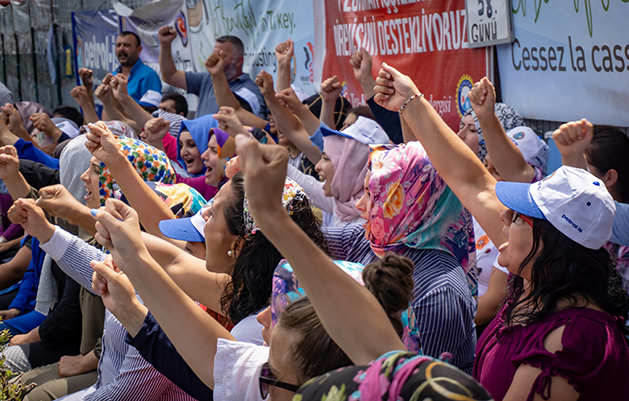Today, a court in Paris will begin hearing the defamation suit that the Luxembourg-based holding company Socfin and its Cameroonian subsidiary Socapalm have brought against three French media outlets (Mediapart, L’Obs and Le Point) and two NGOs (Sherpa and ReAct) over articles about protests by rural residents and farmers who live near plantations run by these two companies in West Africa.
The two companies are closely linked to the French conglomerate Bolloré, whose chairman and CEO, Breton businessman Vincent Bolloré, sits on their boards.
A Paris court yesterday dismissed the latest of many lawsuits by the Bolloré group against the Paris-based weekly magazine Les Inrocks. But tomorrow’s case marks a new stage in the lawsuits brought by the Breton billionaire and his partners against media outlets, NGOs and journalists who try to shed light on his business activities in Africa, his links with Socfin and the consequences of their large-scale land acquisitions.
Since 2009, more than 20 defamation suits have been brought in France – or in other countries in order to circumvent France’s 1881 press freedom law – by the Bolloré group or Socfin in response to articles, TV reports, NGO reports and even a book. The targets of these actions have included France Inter, France Culture, France Info, France 2, Bastamag, Libération, Mediapart, Rue 89, Greenpeace, ReAct and Sherpa. More than 40 reporters, photographers, media lawyers, NGO representatives and media CEOs have been involved (list below).
Because of their scale and systematic nature, we regard these legal actions as “gag suits” – lawsuits designed to suppress criticism. Big multinational corporations are increasingly resorting to such procedures. Apple, Areva, Vinci and Véolia have all recently sued NGOs or whistleblowers.
By bringing defamation suits with such unprecedented frequency – even when they are abandoned mid-course – the Bolloré group is now retaliating in an almost automatic manner to any public reference by outsiders to its African activities.
These lawsuits are reinforcing the other methods of obstructing media freedom to which the Bolloré group resorts. In 2014, for example, the group’s advertising agency Havas tried to withdraw advertising worth more than 7 million euros from the newspaper Le Monde after it ran a story about Vincent Bolloré’s activities in Côte d’Ivoire. Canal+, a TV channel owned by the Bolloré entertainment company Vivendi, has censored or suppressed current affairs documentaries before they were broadcast.
Systematic lawsuits of this kind aim to pressure, financially weaken, and isolate any journalist, whistleblower or NGO that tries to shed light on questionable activities by big corporations such as Bolloré. The goal is to silence them and deter investigative reporting in order to protect “business confidentiality,” especially when the business activity concerned could have bad consequences for some.
They constitute direct attacks on the public interest and freedom of expression, and they target local communities, journalists, grass-roots groups, lawyers and whistlelowers – all the links in the chain for defending rights.
We – grass-roots collectives, journalists, media outlets and NGOs – offer our support to the journalists and NGOs who will be in court on 25 and 26 January, and to all those who are the targets of such gag suits. France needs legislative amendments akin to those adopted in Quebec province and in certain US and Australian states that strengthen freedom of expression and provide better protection for the targets of gag suits. Providing information is not a crime! #We won’t shut up!
Signatories
Jean-Pierre Canet (journaliste), Benoît Collombat (journaliste, Radio France), Nadia Djabali (journaliste), Samuel Forey (journaliste, prix Albert Londres 2017, L’Ebdo), Raphaël Garrigos (journaliste, Les Jours), Simon Gouin (journaliste, Bastamag), Maureen Grisot (journaliste), Elodie Guéguen (journaliste, Radio France), Pierre Haski (journaliste, Rue 89), Thomas Horeau (journaliste, France 2), Dan Israel (journaliste, Mediapart), Erik Kervellec (directeur de la rédaction, France Info), Geoffrey Le Guilcher (Les Inrocks), John-Paul Lepers (journaliste, La Télé Libre), Julien Lusson (ancien directeur de publication, Bastamag), Jacques Monin (journaliste, Radio France), Jean-Baptiste Naudet (journaliste, L’Obs), Nicolas Poincaré (journaliste, Europe 1), Martine Orange (journaliste, Mediapart), Fanny Pigeaud (journaliste), Matthieu Rénier (journaliste, prix Albert Londres 2017, France 2), Isabelle Ricq (photographe), Jean-Baptiste Rivoire (journaliste, Canal+), Isabelle Roberts (journaliste, Les Jours), Agnès Rousseaux (journaliste, Bastamag), Ivan du Roy (journaliste, Bastamag), David Servenay (journaliste), David Thomson (journaliste, Prix Albert Londres 2017, RFI), Nicolas Vescovacci (journaliste), Tristan Waleckx (journaliste, prix Albert Londres 2017, France 2).
Medias ans organizations
Abaca Press, ActionAid France, AFASPA 95, Alternatives économiques, Association de la presse judiciaire, Attac France, Bastamag, Bondy Blog, collectif « Informer n’est pas un délit », collectif « On ne se taira pas », Collectif des associations citoyennes, CRID, France Libertés, GRAIN, Greenpeace France, Les Jours, Mediapart, Prix Albert Londres, Ritimo, ReAct, Reporters sans frontières, Sherpa, Survie, La Télé Libre, Union syndicale Solidaires.
French Sociétés des journalistes of :
AFP, BFM TV, Challenges, Les Echos, Europe 1, France 2, France 3, Le Monde, L’Humanité, Libération, L’Obs, Mediapart, M6, Premières Lignes, Radio France, RMC, RTL, Télérama, TF1, TV5Monde, La Vie.











